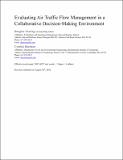Evaluating air traffic flow management in a collaborative decision-making environment
Author(s)
Fearing, Douglas; Barnhart, Cynthia
DownloadBarnhart_Evaluating air traffic.pdf (287.6Kb)
OPEN_ACCESS_POLICY
Open Access Policy
Creative Commons Attribution-Noncommercial-Share Alike
Terms of use
Metadata
Show full item recordAbstract
The collaborative decision-making (CDM) framework introduced into ground delay programs in the late 1990s is an integral component of FAA's traffic flow management (TFM) procedures. CDM allows FAA to act as a mediator when managing TFM programs, transferring as much decision making as possible to the individual airlines. Although this approach has been highly successful in practice, it creates a new question for the research community: How should proposed enhancements to TFM be evaluated in a CDM environment? A sequential evaluation procedure, developed in this paper, addresses this question. The procedure includes airline disruption responses and a quasi-compression operation, attempting to mimic the three-stage CDM process. To model airline disruption responses, an integer optimization model was developed to balance operational and passenger considerations in determining which flights to cancel, swap, or delay. The value of this procedure is demonstrated by analyzing an optimization-based TFM approach in the CDM environment.
Date issued
2011-07Department
Massachusetts Institute of Technology. Department of Civil and Environmental Engineering; Massachusetts Institute of Technology. School of EngineeringJournal
Transportation Research Record Journal of the Transportation Research Board
Publisher
Transportation Research Board
Citation
Fearing, Douglas, and Cynthia Barnhart. “Evaluating Air Traffic Flow Management in a Collaborative Decision-Making Environment.” Transportation Research Record: Journal of the Transportation Research Board 2206.-1 (2011): 10–18.
Version: Author's final manuscript
ISSN
0361-1981